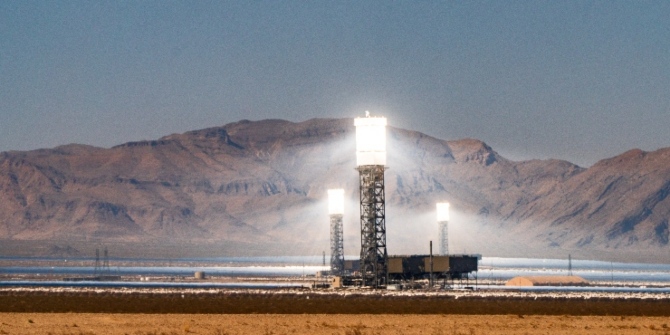In Down to Earth: Politics in the New Climatic Regime, Bruno Latour explores the political and philosophical challenges proper to a time defined by an environmental and socio-economic crisis. Rodrigo Muñoz-González welcomes this energetic, compelling and provocative attempt to find an alternative vision to the contradictory and flawed project of modernity.
Down to Earth: Politics in the New Climatic Regime. Bruno Latour (trans. by Catherine Porter). Polity. 2018.
In its Greek roots, ‘crisis’ – or krisis – means decision, a turning point. This sense of choosing between paths is often a symptom of a wider chasm, originating thanks to certain conditions, abuses and misgivings. Climate change is not the exception.
In Down to Earth: Politics in the New Climatic Regime, Bruno Latour explores the political and philosophical challenges proper to a time defined by an environmental and socio-economic crisis. This new situation pinpoints the contradictions and deficiencies of modernity as a project, obliging an imperative endeavour of rethinking the role and place of human societies in a world which is reacting against them.
This book is a short but lucid effort towards making sense of the fundamental dilemmas derived from climate change: nature is no longer an inert background from which resources are extracted for human activities; rather, it has reclaimed its role as an active agent in the fate of the planet.
Latour starts his argument by proposing that three distinct phenomena – or ‘diseases’ – of contemporary societies share a deep connection. The processes of deregulation and globalisation, rising inequalities (including the current massive migratory movements) and climate change denial are specific manifestations of a historical and political period. This period has been developed following the idea of an ‘open world’; yet, it has remained open solely for a few groups. One hegemonic vision has guided what was supposed to be a borderless and pluralistic global order. Modernity, thus, has taken an aspirational set of values, put forward by these few groups, as a whole reality: modernity considers its normative claims as a complete ontology.
 Image Credit: (KyOn Cheng CCO)
Image Credit: (KyOn Cheng CCO)
It is with modernity as a backdrop that diverse struggles are born. For Latour, the basic conflict entails the opposition between the local and the global. The former implies a resistance anchored in a need for locality, comprising traditional outbursts of nationalisms and xenophobia. On the contrary, the global – being the spearhead of modernity – embodies a planetary order based on an idea of an ever-expanding progress. Progress, under this guise, is a signifier of free markets, less governmental control and vigorous technological innovation. This dichotomic tension created a political horizon for both the right and the left, which draw from the rhetoric of moving ahead or staying behind. Other alternatives were not contemplated, or they were just adapted to this dual model.
But the relationship between these two ‘attractors’, as Latour calls them, has eroded, generating the way for a new option. At this point, Trumpism, Brexit and other populist movements enter the stage. This attractor is named the ‘Out-of-This-World’, for it does not consider material constraints, the limits imposed by nature. Under this view, climate change denial happens, and the planet is regarded as an endless depository of raw materials. Behind this, there are elites and groups with clear interests who benefit from this detachment of the actual physical world, from living in an ‘offshore’ reality. The notion of a common world is obliterated, being replaced by contradictory principles that, on the one hand, promise to heal the maladies of a liberal status quo by restoring a lost time (for instance, the America of ‘Make America Great Again’), and, on the other, establish the agenda of the most powerful, that 1 per cent that does not want to share the planet.
Whilst the ‘Out-of-This-World’ preaches a complete negation of the limits and pressures of reality, the tension between the local and the global views nature as a force that can be tamed and rationalised. Then, what can be done? Are we tied to an inevitable climatic catastrophe? Latour suggests another attractor, one which actualises the politico-philosophical dilemmas of our current age and that could bring them to particular actions. He calls this ‘the Terrestrial’, for it follows the idea that humans do not comprise the ‘centre’ of nature anymore; rather, we are in constant interaction with other beings and natural phenomena. Hence, the New Climatic Regime demands a focus on the geo-social: each human activity has to be considered along with the impact it will have on the planet.
‘The Terrestrial’ exposes that we are now living in the Anthropocene, an age in which every human activity has a consequence in the natural order. This conception gives social agency to nature: human affairs are being shaped by natural manifestations, and vice versa. This entails a shift from a notion of ‘nature-as-universe’ to one of ‘nature-as-process’, a decentred vision which highlights the immediacy of the world. For Latour, the New Climatic Regime requires a new set of values and meanings upon which the societies of the future must be built. This change is also analytical given that it involves the substitution of an understanding based on systems of production to one focused on a system of engendering. A system of engendering leads to a form of politics in which not only human actors are acknowledged; instead, overlapping dynamics and attachments between diverse natural beings and settings are put at the forefront.
Overall, the book provides a strong point of reference for continuing the efforts against climate change. In this case, Latour proposes a philosophical scaffold for the environmental crisis. Indeed, his observations and suggestions bring together the main conditions and requirements necessary to achieve a ‘terrestrial’ way of doing politics. Nonetheless, the challenge is how to transport this repertoire of values and meanings to concrete policies. The need for change is obvious, but its application remains obscure. For Latour, this is an opportunity to overcome the division between right and left; nevertheless, it is difficult to imagine a full embrace of a political ecology across the whole ideological spectrum. This difficulty is key to reflecting on the possibilities of changing a global order grounded in an unequal distribution of power and economic – and natural – resources.
Latour’s claim of recognising ourselves as ‘terrestrials’ summarises the current urgency of achieving emancipation through an integral framework which takes into account multiple voices and the now-evident dependency of human societies upon nature. Yet, this claim is done under a Western, and specifically European, standpoint – a fact that Latour rightly admits. Maintaining a horizontal relationship with nature has been the core belief of many cosmologies of indigenous people across the planet. The critique of modernity, then, must also signal how certain epistemologies of coexistence with Earth were forgotten, and in many cases trashed, in favour of development models based on the interests of a few nations and groups. Perhaps the New Climatic Regime also needs a reconstruction of those knowledges that once exhorted a balance between human activity and natural processes.
Still, Down to Earth is an energetic and compelling attempt at making sense of a moment in history where many certainties have been put into question. Bruno Latour has given us an inspiring and provocative argument which seeks to find an alternative vision to the contradictory and flawed project of modernity. Before coming up with more nuanced and harmonious ideals of progress, we need to imagine a better Earth. This is crucial in order to aspire to new horizons. On multiple occasions, Latour has proclaimed that ‘we have never been modern’; perhaps it is time to accept, instead, that we have always been terrestrial.
- This review originally appeared at the LSE Review of Books.
Please read our comments policy before commenting.
Note: This article gives the views of the authors, and not the position of USAPP– American Politics and Policy, nor of the London School of Economics.
Shortened URL for this post: http://bit.ly/2GrV6JI
About the reviewer
Rodrigo Muñoz-González – LSE Media and Communications
Rodrigo Muñoz-González is a PhD candidate at the Department of Media and Communications of the London School of Economics. His main areas of interest are audience studies, political economy, new media and the materiality of communication.


 Find this book:
Find this book: 




1 Comments